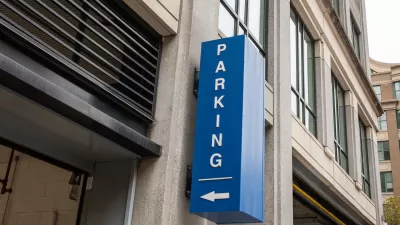The city approved changes called for by a May resolution that eliminate parking requirements in all neighborhoods.

Austin became one of the largest U.S. cities to eliminate parking requirements citywide, reports Audrey McGlinchy for KUT News. Earlier this year, the city council voted in favor of a resolution tasking city staff with removing parking requirements from city code. The revised rules were approved last week.
According to the article, “City rules still require builders to provide parking spots for disabled people, per the Americans with Disabilities Act. In addition, special zoning districts within the city would still be under the city’s former parking minimum rules, including neighborhoods like Hyde Park.”
The city hopes the move will help nudge more people toward public transit as well as create more affordable housing. “In Austin, city departments say one parking spot can cost a developer anywhere from $5,000 to $60,000, depending on whether they’re building a surface parking lot or a concrete garage.”
FULL STORY: Austin becomes one of the largest cities in the country to get rid of parking requirements

Planetizen Federal Action Tracker
A weekly monitor of how Trump’s orders and actions are impacting planners and planning in America.

Maui's Vacation Rental Debate Turns Ugly
Verbal attacks, misinformation campaigns and fistfights plague a high-stakes debate to convert thousands of vacation rentals into long-term housing.

Cuomo Is the Candidate of Both NIMBYs and Developers. What Gives?
In the New York City mayoral race, odd bedfellows align to preserve the housing status quo.

San Antonio and Austin are Fusing Into one Massive Megaregion
The region spanning the two central Texas cities is growing fast, posing challenges for local infrastructure and water supplies.

Charlottesville Temporarily Has No Zoning Code
A judge ordered the Virginia city to throw out its newly revised zoning code, leaving permitting for new development in legal limbo.

In California Battle of Housing vs. Environment, Housing Just Won
A new state law significantly limits the power of CEQA, an environmental review law that served as a powerful tool for blocking new development.
Urban Design for Planners 1: Software Tools
This six-course series explores essential urban design concepts using open source software and equips planners with the tools they need to participate fully in the urban design process.
Planning for Universal Design
Learn the tools for implementing Universal Design in planning regulations.
Heyer Gruel & Associates PA
JM Goldson LLC
Custer County Colorado
City of Camden Redevelopment Agency
City of Astoria
Transportation Research & Education Center (TREC) at Portland State University
Jefferson Parish Government
Camden Redevelopment Agency
City of Claremont





























